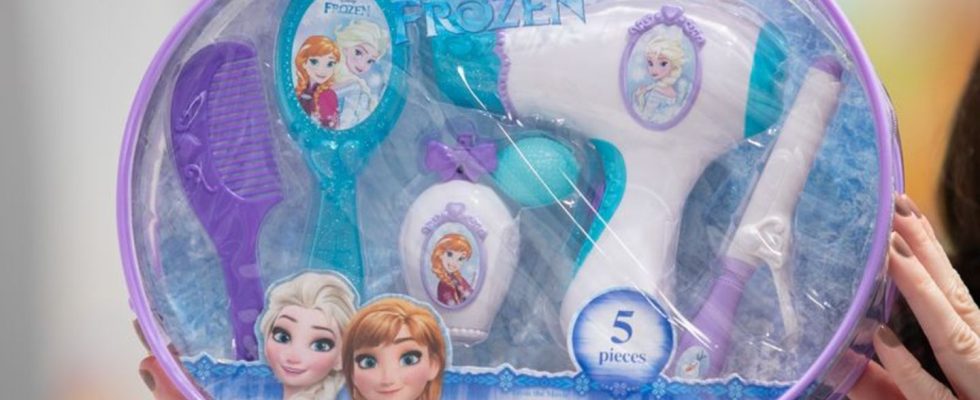toys
Star Wars, Harry Potter, Pokémon: licensed toys in stores
Figures from the Disney film “Frozen 2” adorn parts of a toy beauty set from the Smoby brand. photo
© Daniel Karmann/dpa
In toy stores you are often spoiled for choice: countless cars, plush toys and puzzles are vying for your attention. Popular film heroes and brands can make the difference.
Puzzles with Harry Potter or Disney themes, building sets with Star Wars spaceships, Paw Patrol dogs and Pokémon fantasy creatures to cuddle with – which characters from films, series, books and computer games are currently popular can be quickly identified when strolling through toy stores. Licensed toys are popular – among children, adults, manufacturers and retailers. Many of them are under the Christmas tree again this year. But there is no guarantee of success.
For a long time, the Federal Republic was at the bottom when it came to licenses, says Joachim Stempfle from the market research institute Circana. “In the meantime, Germany has made enormous gains.” This year, licensed products are forecast to account for just over a quarter of total toy sales. According to estimates by the toy trade association, this could be 4.5 billion euros at the end of the year – which would be four percent less than the year before.
Surprisingly positive development
The manufacturers of licensed products are also feeling the effects of the slowdown in purchasing sentiment this year. At two percent, there was a slight decline compared to the previous year, but this was significantly lower than in other toy areas, says Stempfle. The licenses are still at an all-time high, which no one expected years ago. “This is because many large manufacturers work with licenses and many of them are very successful,” says Stempfle.
The licensing business is actually old hat. There were already suitable products for the Mickey Mouse comics, explains Werner Lenzner, licensing specialist at the Fürth toy manufacturer Simba Dickie. With the first Star Wars film in 1977, the topic gained more and more momentum. According to Lenzner, the group of companies near Nuremberg now generates a quarter of its sales from licenses. The advantage is that the brand is already known to the target group. “It just sells better and faster.”
Manufacturers pay for recognition
Licensed products are attracting more attention, confirms marketing professor Andreas Fürst from the University of Erlangen-Nuremberg. Consumers are also generally willing to spend more for a well-known brand. The companies could therefore charge more for the products – and would have to because of the license fees alone.
Even everyday products such as soap bubbles or pencil cases could benefit from licenses, says Lenzner. “With licenses you can score points against the competition. These arouse desire.” Children in particular are brand-conscious, says Eva Stemmer from the Brandmate trade fair, which brings the licensing industry together in Offenbach every year. For example, while parents valued ergonomics when buying a school bag, children raved about the pink model with “Barbie” on it, she says.
Brand alone doesn’t work
Put a well-known figure on a product and it will sell? It’s not that simple, emphasizes Stemmer. “You need products that fit the target group.” Marketing expert Fürst also thinks so: If the connection to the license is not obvious, the products sell less well. “In extreme cases, this can lead to brand damage for the manufacturer and the licensed object.”
Sometimes it’s puzzling why one licensed toy works and another doesn’t, says Simba Dickie expert Lenzner. “A license is also a bit of a gamble.” And sometimes success is short-lived. “There are licenses that are established and remain for years,” says market researcher Stempfle. Others quickly disappeared again. “In order to keep licenses alive, new products, but above all new content, have to come.”
The “Barbie” movie
An example of this is the “Barbie” film. This also boosted sales of the dolls. Manufacturer Mattel has announced further films based on toys such as the Hot Wheels cars and Polly Pocket figures. Some companies now even have their own studio departments and are releasing a series or film to accompany a new toy series, as Lenzner explains. An effort that can pay off: “If you have a good brand, there is a gold rush atmosphere,” says Stemmer.

